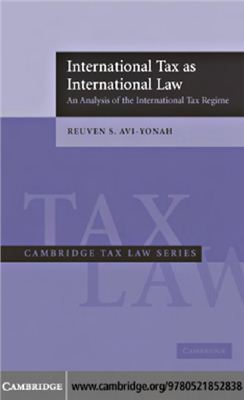Cambridge Tax Law Series, Cambridge University Press 2007.
224p.
This book examines the coherent inteational tax regime that is embodied both in
the tax treaty network and in domestic laws, and the way it forms a significant part of
inteational law, both treaty-based and customary. The practical implication is that
countries are not free to adopt any inteational tax rules they please, but rather operate
in the context of the regime, which changes in the same ways inteational law changes
over time. Thus, unilateral action is possible, but is also restricted, and countries are
generally reluctant to take unilateral actions that violate the basic norms that underlie
the regime. The book explains the structure of the inteational tax regime and analyzes
in detail how U.S. tax law embodies the underlying norms of the regime.
reuven s. avi-yonah is the Irwin I. Cohn Professor of Law and Director of the
Inteational Tax LLM Program at the University of Michigan Law School. Dr. Avi-
Yonah graduated fromtheHebrewUniversity in 1983, received his Ph.D. in history from
Harvard University in 1986, and received a J.D. from Harvard Law School in 1989. He
practiced tax law in Boston and New York until 1993. He became an Assistant Professor
of Law at Harvard Law School in 1994 and moved to the University of Michigan in
2000. He has published numerous articles on domestic and inteational tax issues and
is the author of six other tax books. He has served as consultant to the U.S. Treasury
and the Organisation for Economic Co-operation and Development (OECD) on tax
competition issues and has been a member of the executive committee of the New York
State Bar Association Tax Section and of the Advisory Board of Tax Management, Inc.
He is currently a member of the Steering Group of the OECD Inteational Network
for Tax Research, an Inteational Research Fellow of the Oxford Centre for Business
Taxation, and Chair of the American Bar Association Tax Section VAT Committee.
This book examines the coherent inteational tax regime that is embodied both in
the tax treaty network and in domestic laws, and the way it forms a significant part of
inteational law, both treaty-based and customary. The practical implication is that
countries are not free to adopt any inteational tax rules they please, but rather operate
in the context of the regime, which changes in the same ways inteational law changes
over time. Thus, unilateral action is possible, but is also restricted, and countries are
generally reluctant to take unilateral actions that violate the basic norms that underlie
the regime. The book explains the structure of the inteational tax regime and analyzes
in detail how U.S. tax law embodies the underlying norms of the regime.
reuven s. avi-yonah is the Irwin I. Cohn Professor of Law and Director of the
Inteational Tax LLM Program at the University of Michigan Law School. Dr. Avi-
Yonah graduated fromtheHebrewUniversity in 1983, received his Ph.D. in history from
Harvard University in 1986, and received a J.D. from Harvard Law School in 1989. He
practiced tax law in Boston and New York until 1993. He became an Assistant Professor
of Law at Harvard Law School in 1994 and moved to the University of Michigan in
2000. He has published numerous articles on domestic and inteational tax issues and
is the author of six other tax books. He has served as consultant to the U.S. Treasury
and the Organisation for Economic Co-operation and Development (OECD) on tax
competition issues and has been a member of the executive committee of the New York
State Bar Association Tax Section and of the Advisory Board of Tax Management, Inc.
He is currently a member of the Steering Group of the OECD Inteational Network
for Tax Research, an Inteational Research Fellow of the Oxford Centre for Business
Taxation, and Chair of the American Bar Association Tax Section VAT Committee.

